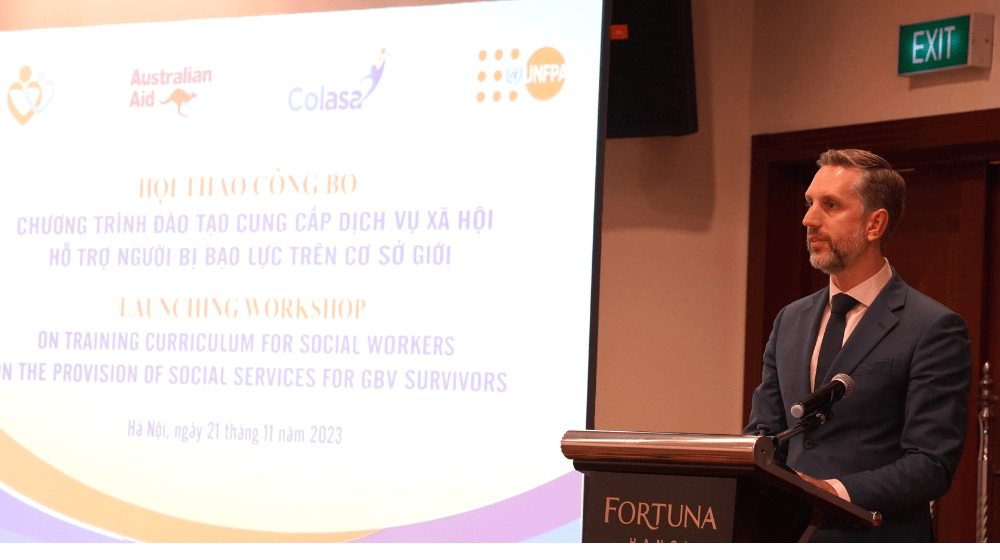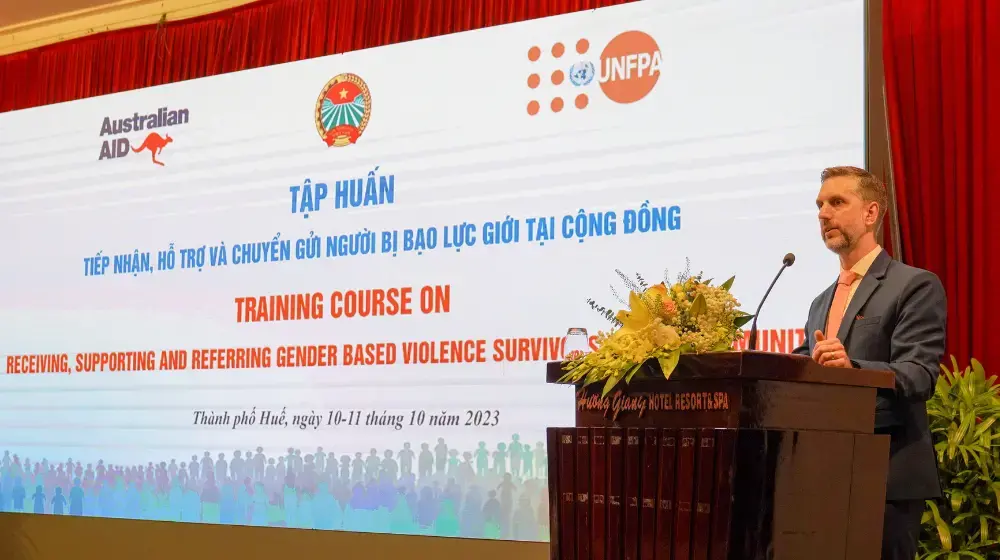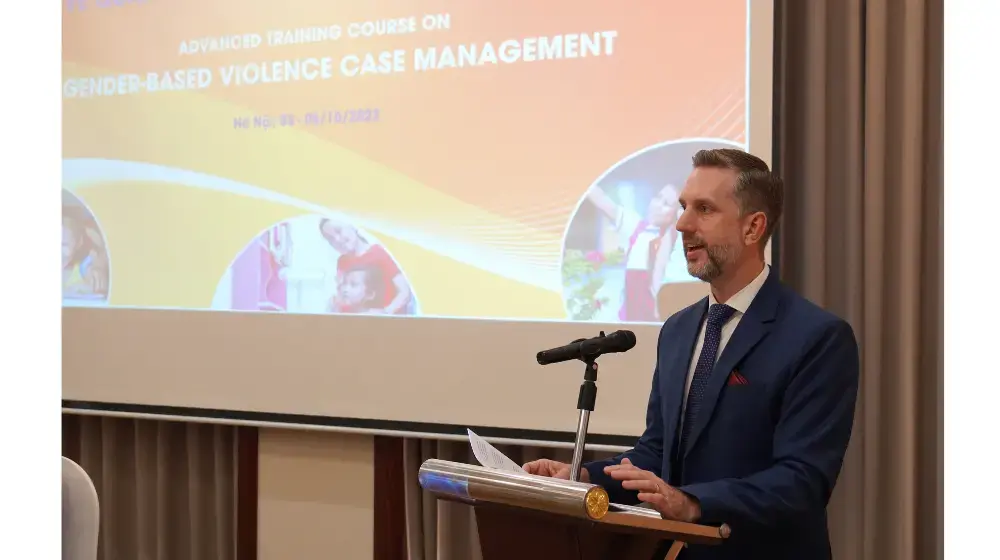- Excellency Mdm. Nguyen Thi Ha, the Vice Minister of Labour, Invalids and Social Affairs;
- Ms. Nguyen Thi Van, the Principal of the Training Centre on Labour and Social Affairs COLASA, affiliated to the Ministry of Labour – Invalids and Social Affairs;
- Senior officials from the Government’s ministries and agencies;
- Representatives from the local authorities of the northern provinces;
- My colleagues from UNFPA and other UN agencies;
- And local media.
I would first like to congratulate the Ministry of Labour, Invalids and Social Affairs for the successful launch of the National Action Month on gender equality under the theme to “Ensure social protection, empower and create opportunities for women and girls to achieve gender equality and eliminate gender-based violence”. I’m impressed by the strong political commitment made by His Excellency Minister Dao Ngoc Dung at the launch. I remember this strong commitment from my first meeting with Minister Dung where he affirmed his support to UNFPA’s interventions to prevent and respond to gender-based violence against women and girls and to provide quality care for older persons in Viet Nam.
UNFPA in Viet Nam together with other UN agencies will soon launch our global campaign on 16 days of activism against gender-based violence with the theme “Invest to prevent violence against women and girls”. The global 16 Days of Activism runs from 25th November, the International Day for the Elimination of Violence against Women, to 10th December, Human Rights Day as a reminder that violence against women and girls is a grave violation of human rights. These events bring us together for our shared goal of eliminating GBV and ensuring gender equality.
I am grateful to Mme Vice Minister Nguyen Thi Ha for your presence at this workshop and to Ms. Nguyen Thi Van for integrating the curriculum to train social workers to provide qualified and skilled social services to support survivors of gender-based violence and to provide long-term care for older persons. UNFPA is honoured to provide technical support to the development of these components. And I believe that this event constitutes another contribution to achieving our shared goal.
The UN System has been working together to implement an “Essential Services Packages for Women and Girls Subject to Violence”, covering social services, health, policing, justice and coordination. UNFPA, UN Women, WHO and UNODC all leant our expertise, and with funding from KOICA and contributions from MOLISA, social workers have received further training to support GBV survivors in Quang Ninh, Thanh Hoa, Da Nang and Ho Chi Minh City.
These four locations also host the new One-Stop Service Centres - two of which are based in Social Work Centres under the Ministry of Labour, Invalid and Social Affairs.
In addition, the national hotline supporting women and girls subject to violence has been established and is being run by the Viet Nam Farmer’s Union.
Yet it is Social Workers who are at the core of our celebration today. These are the people who will be putting all their efforts into making the policy and technical guidance a reality for the lives of women, girls and their communities.
To quote Viet Nam’s father of poetry:
“Inside ourselves there lies the root of good: the heart outweighs all talents on this earth”.
(original: Thiện căn ở tại lòng ta, Chữ tâm kia mới bằng ba chữ tài.)
This passage from The Tale of Kieu speaks to the importance of putting people at the centre of our work – the spirit behind all social services.
Dear participants,
I’m happy to announce that this new curriculum also includes a component to provide better integrated care for older persons in Viet Nam. The guidelines and training materials support long-term care models for older people, currently rolling out in five provinces: Thai Nguyen, Thanh Hoa, Nghe An, Da Nang, and Vinh Long.
The launch of this training curriculum is significant as we respond to the Government’s request for a holistic set of training materials, requiring all social workers, regardless of their levels, to complete within a maximum of 6 weeks.
Importantly, this training curriculum fully aligns with the ASEAN Regional Guidance on “Empowering Women and Children: Delivering Quality Social Work Services for those at risk of or affected by Violence” which was launched just a week ago at the 19th ASEAN official meeting on social welfare and development in Ha Long, Viet Nam.
Also very recently, Mme Ha and I chaired an advocacy workshop in Ha Tinh province to discuss the development of a national multi-sectoral coordination mechanism in preventing and responding to GBV. We heard many valuable recommendations to shape such an important mechanism.
Together, policy guidance, training materials, coordination mechanisms and our own “heart” as the root of good, as Nguyen Du would say, create the impetus and momentum for us to combine our talents to improve the lives of so many people in Viet Nam.
And one last element: budgets.
Allocating an annual budget for training on the provision of social services for GBV survivors and elderly, under the MOLISA system, through COLASA, will enable our “heart” and goodwill to flourish and grow.
I will play my part, as Country Representative, in mobilising some of the necessary resources as well as ensuring UNFPA’s technical support remains available.
My main message today is that it takes all of us, together as a village, to pool our efforts and resources to realise the SDG goals of leaving no one behind to ensure that all women, girls and elderly in Vietnam, particularly those most vulnerable, live a life free of stigma, harassment, abuse and violence.
Thank you. Xin Cam on.




